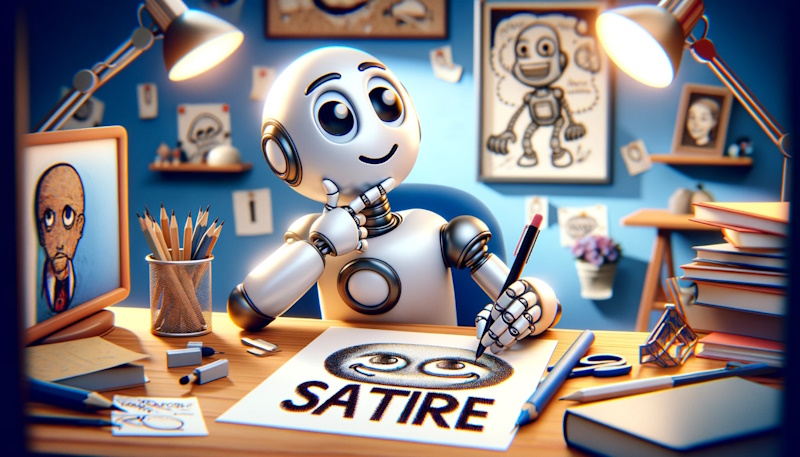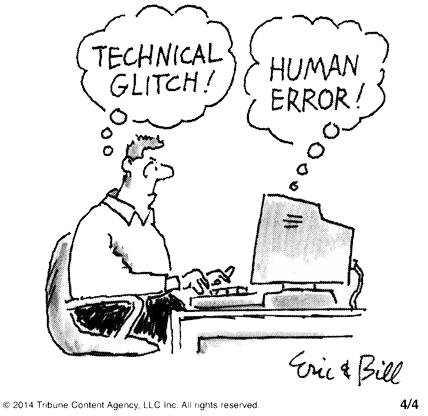 What AI Can't Do
What AI Can't Do
Distinguishing between human and artificial intelligence
While computers have transformed society through their efficiency and ability to process data, they remain fundamentally limited in areas such as creativity, emotional intelligence, and contextual understanding. These limitations underscore the importance of human oversight in the Age of AI, especially in sensitive areas where errors can have dramatic consequences. Here are some of the limitations:
- One of the primary restrictions of computers is their lack of creativity, for they are unable to generate original ideas or solutions independently, which is crucial in fields like art and design.
- Computers struggle with nuanced tasks requiring contextual comprehension, often misinterpreting language and failing to grasp subtle meanings.
- Computer reliance on human input not only compromises their accuracy, but also exposes them to security vulnerabilities, requiring continuous human oversight to manage these risks.
- Computers lack emotional intelligence, which is essential for effective interpersonal communication. They cannot interpret complex social cues, making it challenging for them to engage in meaningful human interactions.
- Some, like the American philosopher Hubert Dreyfus, have argued that human intelligence could not be replicated by computational methods due to the fundamental differences between human cognition and machine processing. They emphasize the importance of tacit knowledge and the embodied nature of human experience, elements which are overlooked by AI researchers.
With our rapidly advancing technology, especially AI, understanding what computers cannot do is fundamental for recognizing the enduring value of human capabilities. As innovations in AI continues to evolve, the interplay between human and artificial intelligence becomes especially important.
 Limitations of Computers
Limitations of Computers
Despite their remarkable capabilities, computers have several inherent limitations that restrict their functionality. Understanding these limitations helps highlight areas where human intervention is necessary, where computers fall short compared to human intelligence, and how we can best interact with them.
Lack of Creativity
A key limitation of computers is their inability to think creatively. While they excel at processing vast amounts of data and performing repetitive tasks, they cannot generate original ideas or solutions independently. This lack of creativity is especially evident in artistic fields such as writing and design, where innovative thinking is crucial. Unlike humans, who can create new concepts and express emotions through art, computers rely solely on existing data and algorithms.

Even though recent AI developments have demonstrated that robots are capable of producing creative works, it is in a manner distinct from that of humans. No matter how great a piece of poetry or art produced by a computer may be, it is always constructed using building blocks extracted from the training data. In other words, it lacks the true ability to engage in what we refer to as original thought or generating fresh ideas.
Contextual Understanding
Another limitation of computers is their inability to grasp contextual understanding. Computers struggle with nuances in language, making it challenging for them to interpret meanings based on context. For example, differentiating between the verb "bear" (to carry) and the noun "bear" (the animal) can pose a problem for computers, which lack the ability to appreciate subtle linguistic cues. Saying "that's a piece of cake" can refer to a yummy dessert, but often refers to something that's easy to do.
Limited Accuracy
While computers are known for their speed and efficiency, they are not infallible. Errors can occur due to software bugs, hardware failures or incorrect data input. Such inaccuracies can have severe consequences in critical sectors like healthcare and finance and rocket science, where minor mistakes can lead to major problems. This limitation emphasizes the need for human oversight in sensitive areas where precision is paramount.

Dependence on Human Input
Computers are inherently reliant on human input for their operation. This dependence also makes them vulnerable to security threats such as viruses and malware. Even with advanced security measures like firewalls and antivirus software, complete protection from these threats is challenging. Individuals dealing with sensitive data may find this aspect particularly concerning, as it underscores the necessity of human oversight in managing computer security.
Lack of Emotional Intelligence
Computers also lack emotional intelligence, which is essential for effective interpersonal communication. Humans are adept at understanding and interpreting complex social cues such as tone of voice, body language, and facial expressions, skills that AI and computers cannot replicate. The depth of understanding required for meaningful human interaction, characterized by empathy and intuition, remains beyond the capabilities of current computer technology. As ChatGPT said: "As an AI language model, I don't have consciousness, self-awareness, or subjective experiences. My responses are generated based on patterns in the data I have been trained on, which includes text about human emotions and experiences, but I do not have feelings myself."

 Areas Where Computers Fall Short
Areas Where Computers Fall Short
Computers have revolutionized various sectors, enhancing productivity and efficiency, yet they remain limited in several significant areas. Understanding these limitations is crucial for recognizing tasks where human capabilities surpass those of computers.
Processing Speed Limitations
Despite their rapid processing capabilities, computers are physically limited in their interactions with the environment. They cannot manipulate objects as humans can, which is particularly evident in fields such as manufacturing and construction, where manual intervention is essential. This constraint can hinder operational effectiveness in scenarios requiring physical engagement.
Limited Multitasking Ability
While computers can perform multiple tasks simultaneously, there is a threshold beyond which their performance declines. As they handle more tasks, the quality and speed of output can diminish, leading to frustrations for users who need to juggle several projects at once. This limitation emphasizes the importance of managing workload effectively to avoid performance degradation.
Lack of Contextual Understanding
Computers operate based on predefined algorithms and do not possess the ability to understand context. For example, they may process text accurately but lack comprehension of the meaning behind it, leading to errors that a human would easily recognize. This deficiency restricts their ability to engage in nuanced tasks that require an understanding of context.
Dependence on Electricity
Computers are entirely dependent on electrical power, rendering them inoperable without a reliable power source. Although laptops can function on battery power, the finite lifespan of batteries means they must eventually be recharged. This reliance can pose significant challenges in remote locations or during power outages, limiting their usability in critical situations. Humans only need a cup of coffee in the morning or Red Bull in the afternoon, or both.
Lack of Decision-Making Ability
Decision-making is a complex process requiring intelligence, wisdom, and judgment, qualities that computers inherently lack. They follow programmed instructions without the capacity to evaluate options or consider the implications of their actions. This absence of decision-making ability underscores the ongoing need for human oversight in critical and subjective scenarios.
Parent: "If all your friends jumped into the well, will
you?"
Child: No!
Chatbot: Yes!
No IQ
Computers do not possess intelligence or reasoning capabilities similar to human beings. They are adept at performing calculations and processing data but lack the cognitive functions necessary for creative thinking or problem-solving in unstructured environments. Consequently, tasks that involve innovation or emotional intelligence remain beyond their reach.
Security Limitations
In an increasingly digital world, computers are vulnerable to security breaches and cyber threats. Their reliance on software can lead to weaknesses that skilled attackers can exploit, compromising data integrity and privacy. This vulnerability necessitates continuous human intervention to safeguard sensitive information.
 Why AI Makes Mistakes
Why AI Makes Mistakes
- Lack of Contextual Understanding: AI models often lack the deep contextual understanding that humans have. For example: a natural language AI might misinterpret sarcasm, humor, or idiomatic expressions or a vision AI might incorrectly identify an object because it doesn’t understand the broader scene (e.g., mistaking a banana for a phone if it's shaped or positioned oddly).
- Over-Reliance on Patterns: AI relies heavily on patterns in data. If presented with a situation outside its training data, it may fail to generalize or rely on irrelevant or coincidental correlations in the data, leading to nonsensical outcomes. For example: An AI trained to identify animals might label a chair with "zebra" patterns as an actual zebra because it associates the stripes with the animal.
- Misinterpreting Ambiguity: AI struggles with ambiguity or incomplete information, which humans often resolve using intuition or common sense. For example: If you ask, "How many legs does a chair have?" an AI might confidently answer "4," even though not all chairs have four legs (e.g., rocking chairs, stools).
- Flawed or Biased Training Data: AI learns from the data it's trained on. If the data contains biases or errors, the AI will replicate them: A chatbot might generate biased or nonsensical responses if its training data includes them. An AI might fail at basic tasks it hasn’t explicitly been exposed to in training.
- Limited Real-World Knowledge: AI lacks the "common sense" humans develop from living in and interacting with the world. This means that it might not recognize an obvious joke or absurdity or it can struggle with tasks requiring experiential knowledge. For example: An AI might treat the phrase "raining cats and dogs" literally, without understanding it means "raining heavily."
- Overconfidence in Wrong Answers: AI can provide incorrect answers with high confidence because it doesn’t have the self-awareness or metacognition humans use to recognize uncertainty.
- Autocorrect Errors: AI-driven autocorrect features can misinterpret user input, leading to humorous or confusing text substitutions. For instance, typing "I'll bring the dessert" might be autocorrected to "I'll bring the desert," altering the intended meaning.
- Literal Interpretations by Virtual Assistants: AI assistants may take user commands too literally, resulting in unhelpful responses. For example, asking, "How do I cook a turkey?" might yield a vague answer like "Cook it until it’s done," lacking practical guidance.
- Translation Missteps: AI translation tools can sometimes render idiomatic expressions word-for-word, leading to confusion. A French phrase meaning "when pigs fly" might be translated literally as "when the chickens have teeth," losing the intended meaning.
- Image Recognition Failures: AI systems have misclassified images in ways that seem absurd to humans. For instance, an AI might label a photo of a person holding a toothbrush as "a young boy is holding a baseball bat," demonstrating a lack of contextual understanding.
- Chatbot Hallucinations: AI chatbots can generate plausible-sounding but entirely fabricated information. When asked about a nonexistent phenomenon, a chatbot might provide a detailed explanation complete with fictitious citations, misleading users.
- Erroneous Reasoning in AI Models: Advanced AI models designed for complex reasoning have produced flawed outputs. For example, when tasked with providing instructions to build a birdhouse, an AI might suggest unnecessary steps like cutting sandpaper without purpose, indicating gaps in practical understanding.
 The Future of Computing
The Future of Computing
As computer technology continues to advance rapidly, the future of computing presents both exciting possibilities and new challenges. Innovations in AI and hardware capabilities are expected to redefine the ways humans interact with machines and manage data. However, these advancements also raise ethical concerns and highlight the limitations that still exist within computational systems.
Advancements in AI and Human-Computer Interaction
The integration of AI into computing systems has opened up numerous applications. For instance, AI can now analyze vast datasets, optimize decision-making processes, and even enhance customer service through chatbots and virtual assistants.
These developments signify a shift towards a more collaborative relationship between humans and machines, emphasizing the need for a balance between technology and human intuition. Despite these capabilities, AI is not without its limitations. Current AI systems operate based on predefined algorithms and lack the moral and ethical judgment that characterizes human decision-making. As such, while AI can process information with remarkable speed and accuracy, it cannot replicate the nuanced understanding that humans possess when navigating complex ethical situations. This highlights the necessity of maintaining human oversight in areas where moral judgment is crucial.
Challenges and Ethical Considerations
As we look towards the future, ethical considerations become increasingly significant in the realm of computing. Issues such as accountability, transparency, and the potential for bias in AI systems necessitate a rigorous framework for responsible AI development and deployment. The potential for machines to operate without human intervention poses risks that require careful regulation to ensure that technology serves the greater good rather than undermines it.
As computing systems become more integrated into daily life, concerns surrounding privacy and data security will continue to grow. The rapid evolution of technology necessitates that society grapples with these challenges to safeguard human rights and ensure equitable access to technological advancements.
The Role of Human Intelligence
While the future of computing is undoubtedly intertwined with AI, it is essential to recognize the irreplaceable qualities of human intelligence. As machines take over routine tasks, the emphasis on soft skills such as empathy, creativity, and ethical reasoning will become increasingly vital in the job market. By harnessing the complementary strengths of both AI and human intelligence, we can pave the way for innovations that enhance productivity and improve quality of life while upholding the ethical standards that define our humanity.
 Links
Links
What Computers Can't Do and What Computers Still Can't Do: A Critique of Artificial Reason written several years later.
en.wikipedia.org/wiki/Embodied_cognition
geeksforgeeks.org/difference-between-artificial-intelligence-and-human-intelligence
sbmi.uth.edu/blog/2024/artificial-intelligence-versus-human-intelligence.htm
frontiersin.org/journals/artificial-intelligence/articles
online.maryville.edu/blog/ai-vs-human-intelligence
simplilearn.com/artificial-intelligence-vs-human-intelligence-article
epicpeople.org/human-and-artificial-intelligence
growthtactics.net/skills-that-ai-cant-replace
tutorialsmate.com/2021/05/limitations-of-computer
elizabethbarnes.art/circuits-of-creativity/what-is-creativity-without-intuition